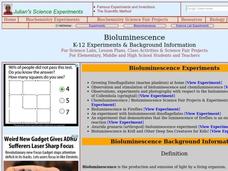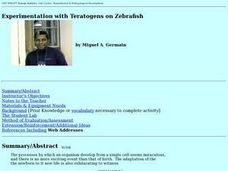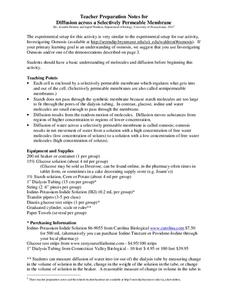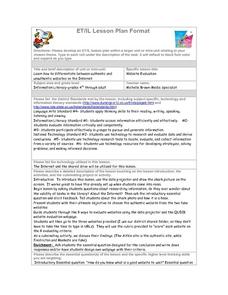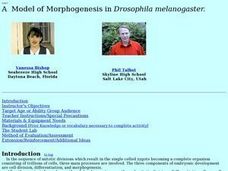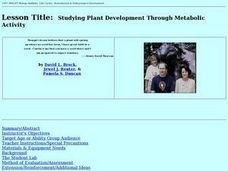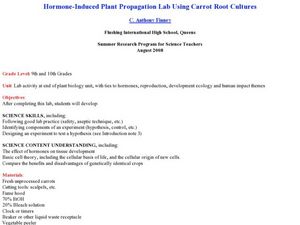Curated OER
The Wonderful World of Waves (Wave Basics)
Students define amplitude, wavelength, frequency, and period, calculate period given frequency, and calculate frequency given period, define crest and trough and locate both on diagram of wave, differentiate between latitudinal and...
Curated OER
From One End to the Other
Seventh graders trace a piece of food through the alimentary canal and differentiate between mechanical and chemical digestion in several different hands-on activities related to digestion.
Curated OER
Bioluminescence
Students differentiate chemiluminescence from bioluminescence. In this biology instructional activity, students explain how fireflies and other animals emit light. They discuss the applications of engineered bioluminescence.
Curated OER
It's Alive! Using Microorganisms in Cooking
Learners create a KWL chart about food. In this chemistry lesson, students differentiate physical and chemical changes. They explain how microorganisms are used in food preparation.
University of Minnesota
Neurotransmission Model
Don't lose your marbles — you'll need them for a lesson on neurotransmission. Young scholars build a neurotransmission model using marbles, beads, rubber bands, string, and other elements. After studying specific neurotransmitters,...
Curated OER
Human Cloning: Is it Biological Plagiarism?
Is cloning good or harmful? Help your class understand the risks and benefits as they read, research, and discuss human cloning. Individuals form teams, research information, and present to the class before concluding with an in-depth...
Virginia Department of Education
Isotopes
Lead your class through the amazing world of isotopes as they investigate the various properties they contain and further understand their respective location on the periodic table. They explore half-lives and radioactivity as each...
Serendip
From Gene to Protein via Transcription and Translation
DNA carries the codes for creating just the right protein. A well-designed activity leads pupils through the process from start to finish and everywhere in between. Guiding questions with supporting video help scholars understand the...
Curated OER
Experimentation with Teratogens on Zebrafish
Pupils compare mitosis and meiosis with regard to chromosome number in parent cells versus daughter cells, types of cells produced, total number of cells produced, and the number of divisions. In groups, identify and differentiate the...
Curated OER
Karyotype Puzzle
Students identify chromosome pairs based upon band patterns and location of centromere. They order chromosome pairs based upon size. Students differentiate normal karyotypes from abnormal karyotypes. They correctly record karyotype...
Curated OER
Gene Regulation Mechanisms
Students explore genetics. They discuss how chromosomes and/or genes are regulated during the life of an organism. In a lab setting, students compare and contrast the genomic regulation of prokaryotic and eukaryotic cells using...
Curated OER
Anatomy and Physiology Study Questions on Immunology
In this anatomy and physiology study question worksheet, young scholars define 20 terms related to the immune system. They answer 19 short answer questions that deal with immunology, autoimmune diseases, and the components and cells...
Curated OER
Diffusion Across a Selectively Permeable Membrane
Students investigate how water passes through cell membranes. In this biology lesson, students differentiate osmosis and diffusion. They illustrate the movement of water in both processes.
Curated OER
Learning Types of Editorials - and Writing Some
Students recognize and differentiate between the three types of editorials in order to write editorials for the school newspaper. In this editorials instructional activity, students read example persuasive and interpretative editorials....
Curated OER
Cloning And b-Galactosidase
Students investigate cloning using E coli cultures. Through laboratory exercise, they determine if E coli cells contain b - galactosidase.
Curated OER
REPRODUCTION
Students complete a variety of activities to study different concepts in Science. The activities are part of a layered curriculum. This is used to differentiate instruction and give a wide variety of assessment opportunities.
Curated OER
Website Evaluation
Students examine how to differentiate between authentic and unauthentic websites on the Internet. They view and discuss a photo of a shark that is a hoax, then discuss the eight ways to evaluate websites. Students then evaluate three...
Curated OER
The Expenditure Sheet
Students differentiate between expenditure and income. In this algebra lesson, students create a spreadsheet labeling the date, item and amount as they track their expenses. They format the cells of the spreadsheet to do all the...
Curated OER
Bound for Oregon
Middle schoolers engage in a novel study using the layered curriculum style of unit. The unit has many different types of activities that have different ratings of difficulty. This allows for a great deal of differentiation.
Curated OER
Plants
Student identify the characteristics of plants. Through hands-on demonstration, they create a model of plant parts. Students differentiate between the major divisions of the plant kingdom with a particular emphasis on the vascular and...
Curated OER
A Model of Morphogenesis in Drosophila Melanogaster
Students investigate the following scientific terms and ideas: rates of diffusion, the role of morphogens in the development of larva, the chemical dynamics of a cell, and the significance of embryo polarity during development.
Curated OER
Plant Biotechnology: Controlling Tissue Differentation
Learners demonstrate skills of biotechnology stringent aseptic technique and statistical analysis. They describe hormonal control of plant tissue differentiation and relate this to gene expression. Students observe the effects of...
Curated OER
Studying Plant Development Through Metabolic Activity
A hands-on activity which allows students to learn about cellular respiration. This instructional activity contains a range of investigations testing the rates of cellular respiration to demonstrate the relationship between metabolic...
Curated OER
Hormone-Induced Plant Propagation Lab using Carrot Root Cultures
Students evaluate the importance of hormones in living things. In this biology activity, students experiment on carrots to differentiate how humans and plants reproduce. They collect data from experiment to answer analysis questions.


